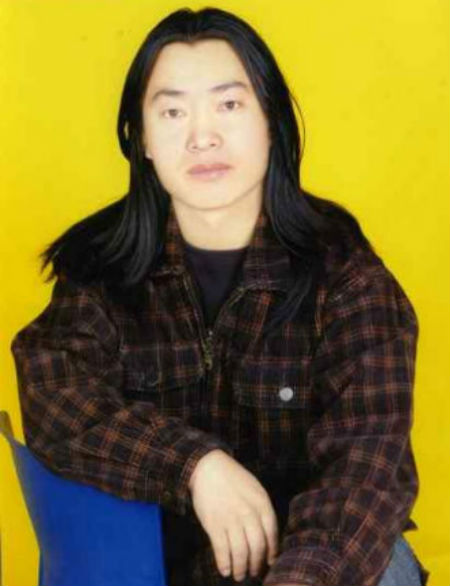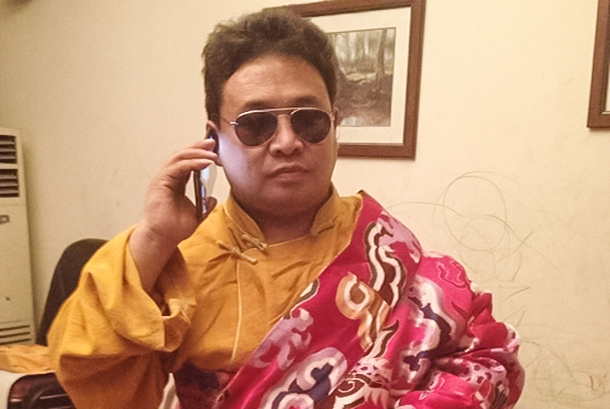Kalsang Yarphel, a popular Tibetan singer, has been sentenced to a four-year prison term by Chinese authorities for performing at concerts and singing songs encouraging the embrace of Tibetan culture. The songs of his performances, including titles such as “We Should Learn Tibetan” and “We Should Unite” call on young Tibetans to “build courage” and think about the country’s “future path.”

Kelsang Yarphel, Tibetan singer and former monk, was sentenced to over two years in prison for his songs (Free Tibet.)
Yarphel, age 39 and father to three children, was sentenced for his role in organizing “Khawai Metok”, translated as “Snow Flower”, a 2012 music festival which encouraged Tibetans to learn to speak, read, and write in their native language. His music arranger and two other associates were also sentenced to jail terms by the same court, for the songs’ illegal use of “political themes.”
“Tibetans! We must learn Tibetan, speak Tibetan, It is our responsibility to learn and speak Tibetan, Tibetans! We must unite!” goes a sample of the lyrics in question, calling for cultural unity in the country where Chinese authorities have made Tibetans’ cultural autonomy the price for Beijing’s rule.
A video of the performance which led to Yarphel’s arrest, with English subtitles, is below.
As Chinese media is heavily censored, reports of Yarphel’s imprisonment have relied on the activist community within Tibet, with former political prisoner Lhamo Kyab, now living in exile, making the first reports via a Tibetan news agency.
China’s government has also banned audio and video recordings of the Snow Flower performances, as reported by the India-based Tibetan Centre for Human Rights and Democracy.
This sentencing comes as part of a continued campaign by the Chinese government of the systematic persecution of Tibetans and their culture. Yarphel joins the ten Tibetan singers already held in custody by Chinese authorities, who have been the subject of human rights campaigns by organizations worldwide, including a petition hosted by The Voice Project and Free Tibet calling for the release of the activist-artists.
With its treatment of both Tibetan cultural figures and the democracy movement in Hong Kong, China has made clear its opposition and systematic combat of all that goes against its state-sponsored identity.
China’s systematic ethnocide in Tibet continues, but more activist-artists are joining in singing songs of pride in their culture, even faced with the potential of imprisonment, as was the case with the singer Gebey, freed earlier this year by a Chinese government faced with international pressure.
We urge you to join us in speaking up for the artists imprisoned by China for singing songs about their own culture here: Free The Tibet 10.
UPDATE: The Tibet Post International cites that China’s Intermediate People’s Court of Chengdu City has sentenced another Tibetan singer, Pema Rigzin, to a two-and-a-half year prison sentence, along with an additional year’s deprivation of political rights.

Pema Rigzin, singer and former monk, was sentenced to two-and-a-half years in prison due to the content of his songs (Tibet Post International.)
Rigzin and his family were denied the right to hire an independent lawyer for his trial, in which he was charged with a prison sentence and a fine of ¥50,000 for the content of his songs such as “Remember Tibet” and “Tears”. In Tibet, it is an illegal and punishable offense to embrace Tibetan culture, to possess photos of the Dalai Lama, to fly the national flag, or to even own a cell phone with patriotic songs on it.
Even singing in the Tibetan language is enough for a song to be considered political in content and punishable with a prison sentence.
China’s government has used its arrests to punish singers, writers, artists, and teachers for promoting Tibet’s culture in the face of Chinese ethnocide, violating numerous treaties of international law, such as the Universal Declaration of Human Rights’ guarantee to the right of artistic expression.
EDIT: An early version of this post mistakenly labeled a photo of Shawo Tashi, sentenced to five years in prison in 2013, as a photo of Kelsang Yarphel. The error has since been corrected. Thank you to the Tibetan Centre For Human Rights and Democracy for notifying us of this mistake.
